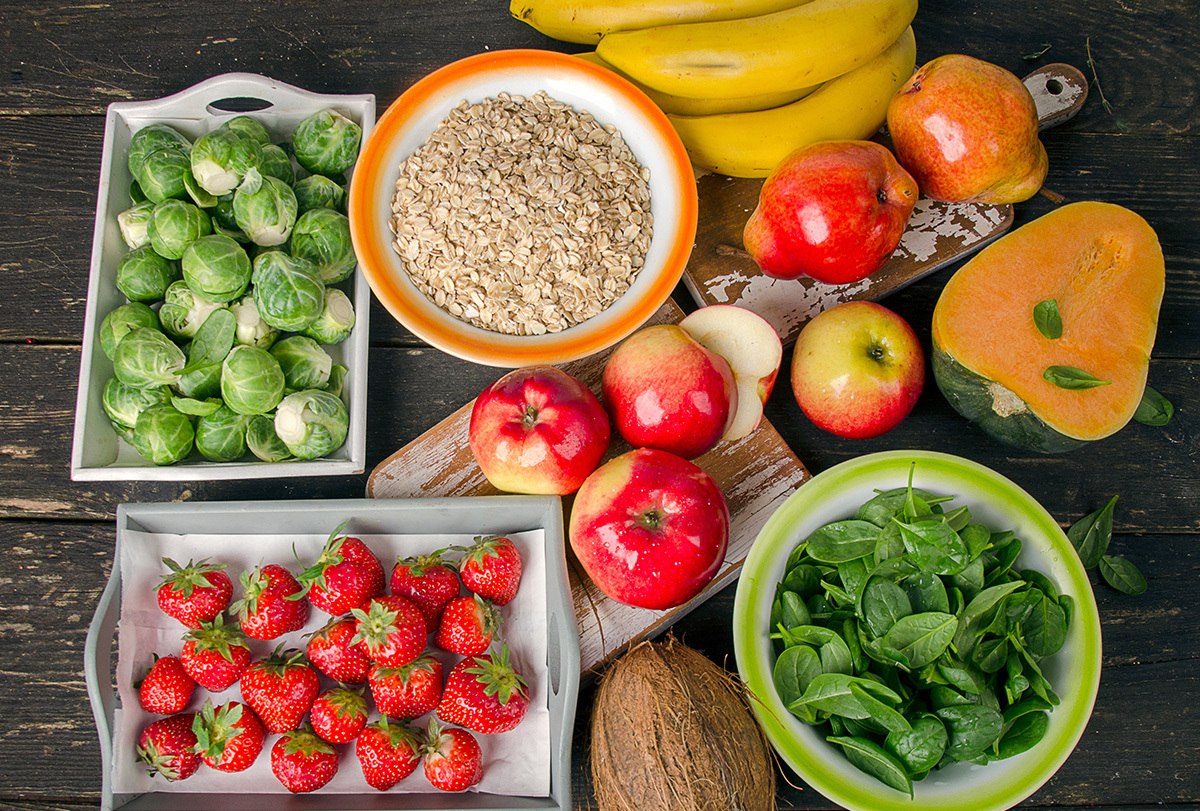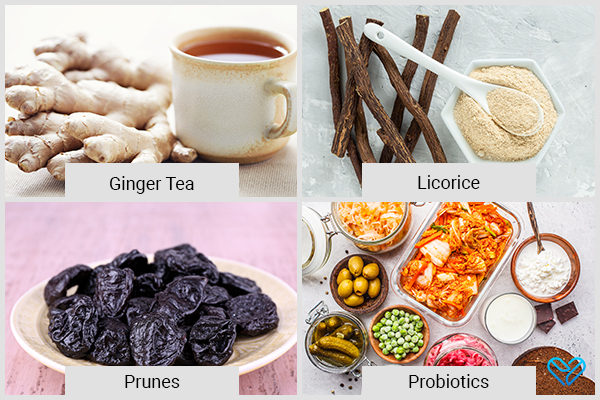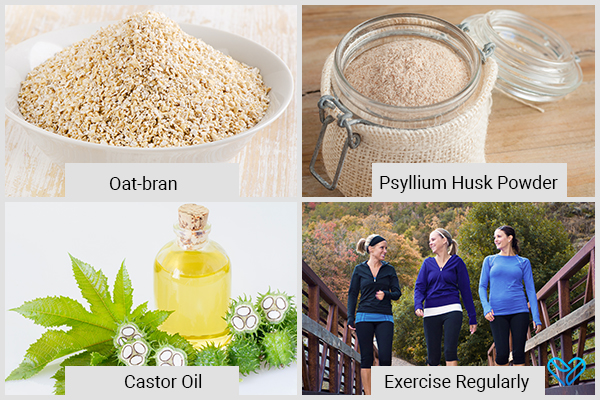In this article:
Constipation can be uncomfortable, and dealing with it can be frustrating. While it’s important to consult with a healthcare professional for chronic or severe cases, several home remedies may help alleviate occasional constipation.

This article will explore some natural remedies that you can try at home to get things moving smoothly.
Home Remedies for Constipation
The following are unconventional solutions that can help solve constipation.
1. Stay hydrated and drink plenty of fluids
Drinking enough water is important for overall health and well-being, including the health of the digestive system. When you don’t drink enough water, your stool can become hard and difficult to pass, leading to constipation.
Research suggests that there may be a causal link between lower fluid intake and constipation. Drinking more water can help soften the stool and make it easier to pass, especially when combined with a fiber-rich diet.
One study found that adults with chronic constipation who increased their water intake to 2 liters per day had greater stool frequency and lesser use of laxatives compared to those who drank less water. (1)
Another study found that when healthy men were restricted in their fluid intake, their bowel function slowed down, but it returned to normal when they resumed regular fluid consumption.
So, if you’re experiencing constipation, drink more water throughout the day and see if it helps. (1)
2. Increase your dietary fiber intake
Fiber is found in foods such as fruits, vegetables, whole grains, and beans. Fiber helps to soften your stool and make it easier to pass.
Researchers have shown that eating more fiber can increase stool frequency in people with constipation. (2) So, if you’re feeling constipated, consume more fiber-rich foods to help get things moving!
3. Make flaxseed cookies
Did you know that consuming flaxseed could help with constipation? A recent study found that baked flaxseed can significantly reduce constipation symptoms.
In a study, researchers checked the effects of flaxseed cookies on diabetic patients with constipation. After 12 weeks, those who ate the flaxseed cookies had some pretty positive changes. Their constipation symptom scores went down, which means they had fewer troubles in the bathroom. Plus, they lost some weight, and their blood sugar levels improved. (3)
Incorporate flaxseed into your diet by baking some delicious flaxseed cookies or adding flaxseed to your meals.

4. Drink senna tea every morning
Senna (Cassia angustifolia) is a flowering plant native to the Middle East and Northern Africa. It is a natural stimulant that gently helps push out stool. It is a special kind of laxative that pediatricians use to help kids who have trouble pooping regularly. (4)
Note: Senna is generally safe and effective for treating constipation, but sometimes, it might cause minor side effects such as tummy cramps, vomiting, and diarrhea. However, these side effects usually go away once your doctor adjusts the dose or tries a different kind of laxative. (4)
Brew senna root into tea by adding and boiling 1 teaspoon of dried senna root powder in a cup of hot water for a few minutes.
5. Enjoy ginger tea in the morning and at night
Ginger has some beneficial effects when it comes to easing abdominal distention (the uncomfortable feeling of bloating). Ginger can help relieve constipation. (5)
Note: People who take ginger are more likely to have a good appetite than those who don’t. So if you’re feeling like you’ve lost your appetite due to constipation, ginger might just bring it back.
6. Incorporate licorice into your diet
Licorice root has some special properties that can aid the digestive system.
Researchers did a study to see how licorice could help people with constipation-predominant irritable bowel syndrome (IBS).
The group who took the formula containing licorice experienced a 20% increase in their bowel movements, improving constipation. Licorice also caused a decrease in straining, abdominal pain, and bloating. (6)
7. Eat prunes daily
Prunes, which are dried plums, can actually help with constipation. They’re packed with fiber, which helps in the smooth movement of stools and promotes a healthy digestive system.
In one experiment, people who ate 100 grams of prunes every day for 3 weeks had more frequent bowel movements compared to those who took a different fiber supplement. Also, prunes can make the consistency of the stool better. (7)
Enjoy prunes as a snack or add them to meals and dishes.

8. Consume probiotics with your meal
Probiotics are good bacteria that live in your gut and help with digestion and overall health.
Researchers have shown that taking a combination of different strains of Lactobacillus and Bifidobacterium probiotics can help reduce constipation and improve the quality of bowel movements. (8)
To incorporate probiotics in your meals, consume yogurt. When choosing yogurt, look for options that specifically mention containing live and active cultures on the label.
Greek yogurt and other fermented dairy products are often good sources of probiotics.
9. Eat oat bran for breakfast
Bran is a natural remedy that contains a lot of fiber. Fiber acts like a gentle broom that sweeps through the digestive system.
In a study, researchers tested bran on a group of constipated patients. Results showed that those who took bran had improvements in their digestion. Their bowel movements became more frequent, and their stools became easier to pass. This means that bran was helping to regulate their digestive system. (9)
Oat bran can be consumed in various ways. It can be cooked and used as a hot cereal for breakfast.
10. Drink a psyllium husk powder and water mix
Psyllium is a special ingredient that serves as a bulking agent. It works by absorbing water and making the stool bigger and softer.
By adding bulk to your stool, psyllium helps stimulate the movement of your intestines. This makes it easier for the stool to pass, thereby relieving constipation. (9)
You can find psyllium husk in the form of powder or capsules at most health food stores or pharmacies. The recommended dosage of psyllium husk is typically 1 teaspoon (around 5 grams) of psyllium husk powder, mixed with a glass of water or your preferred beverage.
11. Take castor oil
Castor oil is have been used as a remedy for a long, long time.
When castor oil is ingested, a substance called ricinoleic acid is released by the oil when it meets certain enzymes in the intestines. Ricinoleic acid activates the EP3 prostanoid receptor, which causes movements in the intestine, thus aiding constipation. (10)
The recommended dosage of castor oil for constipation is usually 1–2 tablespoons (but always follow the instructions on the bottle). Swallow it on an empty stomach. You can mix it with a small amount of juice or water to make it easier to swallow. (Be careful not to exceed the said dosage).
Note: Use castor oil with caution as it may cause cramping, diarrhea, and dehydration. Remember to do this only occasionally and not daily.

12. Exercise regularly
Exercise has been shown to be effective in treating various intestinal diseases, including constipation.
A recent study showed that exercise, particularly aerobic exercises such as jogging, walking, and physical movement, had significant benefits in improving the symptoms of patients with constipation.
Overall, exercising regularly can be a feasible and effective treatment option for patients with constipation, so it’s worth incorporating into your daily routine. (11)
Preventing Constipation
The good news is there are some easy things you can do to prevent constipation: (12)
- For starters, consume more fiber. Fiber is like a superfood for your gut. It helps to move things along and keeps everything flowing smoothly. You can find fiber in fruits, vegetables, and whole grains. Just make sure to avoid high-fructose fruits such as apples and pears if you’re sensitive to bowel issues.
- Another way to keep things moving is by getting more exercise. A little bit of movement can go a long way in helping to get your stool through your colon and out the door. So, take a walk, do some yoga, or try out that new dance video on YouTube.
- Staying hydrated is also important. Make sure to drink plenty of water throughout the day. Caffeine, on the other hand, can be dehydrating, so it’s best to limit your intake of coffee and other caffeinated drinks.
- Lastly, when nature calls, don’t wait. Listen to your body and go when you feel the urge. Holding it in can lead to constipation.
Most-Asked Questions About Constipation
How much water should I drink to prevent constipation?
Aim for about 8 glasses (64 ounces) of water per day.
Can stress contribute to constipation?
Yes, stress can disrupt your digestive system and lead to constipation.
Can constipation be a sign of a more serious condition?
In some cases, chronic constipation may indicate an underlying health issue, so it’s important to speak with a healthcare professional.
Does exercise help with constipation?
Yes, physical activity can stimulate bowel movements and improve digestion.
How long is too long to go without a bowel movement?
If you haven’t had a bowel movement for more than three days, it’s best to consult a doctor.
Can constipation be hereditary?
There may be a genetic predisposition, but lifestyle factors play a significant role as well.
Does traveling often cause constipation?
Changes in routine, diet, and dehydration during travel can contribute to constipation.
Can constipation cause abdominal pain?
Yes, constipation can cause discomfort and cramping in the abdominal area.
Is it normal to have small, pellet-like stools?
No, small and hard stools can be a sign of constipation.
Is constipation common in children?
Yes, children can experience constipation, often due to dietary factors or withholding stools. Nowadays, it is common among all groups, especially children as they consume junk food.
Final Word
If you’re dealing with constipation, try simple home remedies, such as increasing fiber intake, staying hydrated, and staying active. These remedies often work like a charm in improving constipation.
However, if your constipation becomes chronic or is accompanied by concerning symptoms, seek medical advice at once.
 Continue ReadingConstipation: Common Causes, Symptoms, Treatment, and More
Continue ReadingConstipation: Common Causes, Symptoms, Treatment, and More
- Was this article helpful?
- YES, THANKS!NOT REALLY


